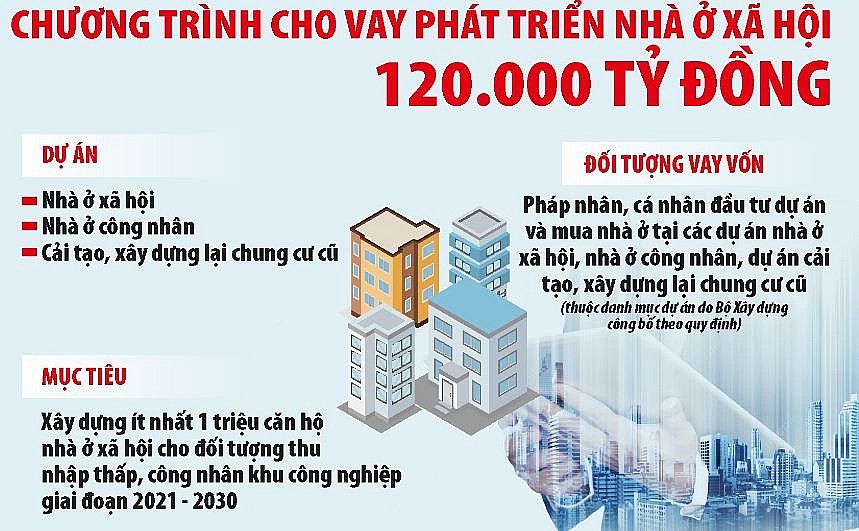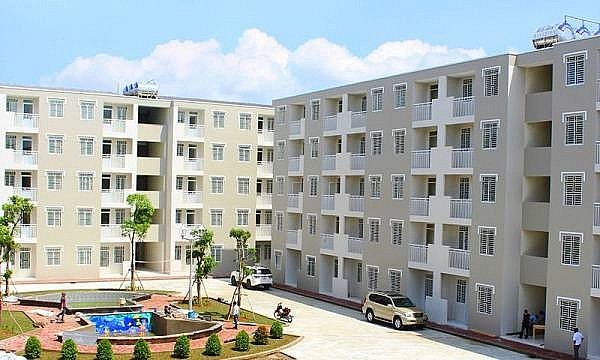(TBTCO) – Credit growth in 2023 is lower than expected due to the difficult economic situation. At this time, an important space to clear the flow of credit and at the same time develop the real estate market healthily is to accelerate social housing development projects. This is the view expressed by Dr. Le Xuan Nghia emphasized in a recent conversation with TBTCVN reporters.
 |
| Source: Resolution 33/NQ-CP Graphics: Van Chung |
PV: Sir, although the Government and the Prime Minister have given many drastic instructions and the banking industry has also made great efforts, the credit growth rate as of early December has only reached more than 9%. In your opinion, what is the main reason why credit flows increased so low?
 |
| Dr. Le Xuan Nghia |
Dr. Le Xuan Nghia: Low credit growth first shows that the economic situation is still very difficult. Demand in the world market decreased as inflation increased and commodity prices escalated, causing people to tend to save money. Although the unemployment rate in developed countries is not high, after many economic and social events, the trend of minimalist consumption and simplifying needs is being responded to.
This causes Vietnam’s export market to shrink, many businesses have no orders, workers lose their jobs… This also causes domestic consumer demand to decrease. In that context, it is difficult for banks to lend. Previously, the loan to collateral ratio was only about 65 – 70%, now some banks have increased it to 80% and still have difficulty finding borrowers.
PV: However, there are still businesses that say they have difficulty accessing capital and cannot borrow capital when they really need it. Is there a cause of credit blockage from the bank?
Dr. Le Xuan Nghia: Businesses that still have difficulty accessing capital are mainly real estate businesses. The remaining manufacturing, import-export businesses have a narrow market and no orders, so why borrow capital? These are not only situational difficulties due to supply chain bottlenecks like during the pandemic but also long-term difficulties.
|
Banks lend only based on collateral “For banks in general, what they care about when lending is the ability to repay debt and collateral. In traditional banking countries, the most important thing is their ability to repay debt. But our banks pay more attention to collateral. If we lend without paying much attention to the ability to repay debt, relying only on collateral, then the bank is no different from a pawn shop. Dr. Le Xuan Nghia |
First of all, because barriers to entering major markets are becoming increasingly strict and consumer demands are increasingly high. One of the big problems that Vietnamese businesses are facing is the requirement to report greenhouse gas emissions. Many businesses in Vietnam’s major export industries, especially the steel industry, failed to implement this report.
Regarding the reasons on the bank side, there are indeed, as Prime Minister Pham Minh Chinh reminded at the recent Conference to discuss solutions to overcome difficulties in credit growth. At the conference, the Prime Minister pointed out that slow credit growth is partly due to economic difficulties, partly due to the ability to meet credit conditions being somewhat poor, but also poses requirements for credit institutions. Credit institutions need to closely follow the situation, fields, industries and be more flexible in lending conditions, especially collateral… At the same time, it is necessary to evaluate cash flow prospects more and more closely; There are general standards and criteria, priorities, and limitations that are correct, successful, and appropriate.
Therefore, I strongly agree with the Prime Minister’s viewpoint at the recent Conference to review credit conditions, be more flexible, and closer to the situation. To do so, banks must improve their ability to appraise projects, to better assess customers’ ability to repay debt, thereby creating flexible and favorable conditions for people and businesses to access capital. only care about collateral.
PV: Low credit growth rate affects GDP growth rate. According to him, in the current difficult economic context with low consumer and investment demand, is there any room left to promote higher credit growth, thereby promoting economic growth?
Dr. Le Xuan Nghia: As the Prime Minister said, credit growth is driven by both the supply and demand sides, not just one side. The credit growth rate is often twice the economic growth rate.
To promote credit, among the tasks and solutions that Prime Minister Pham Minh Chinh recently requested, I think there is a more important and feasible solution: the field of social housing. The current need for social housing is huge. People have needs and have the ability to pay, but the projects that the Government has planned for social housing are hardly implemented.
 |
| Illustration |
The main reason, in my opinion, is policy limitations. Policies for social housing need to be revised in a way that does not require businesses to be responsible for policy issues, such as reviewing documents and subjects. In addition, because these projects are land without land use fees, banks do not dare to accept them as collateral… Furthermore, this field is also subject to many cumbersome and complicated regulations for both people, businesses and banks.
If these problems can be resolved and the social housing market can be “unleashed”, the real estate market will recover quickly and balance, credit will be pumped into the market in a healthy direction, thereby contributing to promoting growth. promote economic growth.
On the contrary, if social housing cannot be removed, the real estate market, if it recovers, will only be in the high-end housing segment, mainly speculative, with a surplus of houses priced at hundreds of millions of dong. per square meter. Millions of low-income working people will find it increasingly difficult to reach their dream of owning a home.
PV: Thank you Sir!
|
Effectively deploy the loan program for social housing development At a recent conference to discuss solutions to overcome difficulties in credit growth, Prime Minister Pham Minh Chinh requested the State Bank to direct credit institutions to review credit conditions, be more flexible, and closely monitor credit conditions. further situation (especially on mortgage assets, loan procedures…) to support businesses and people to access credit capital more conveniently; At the same time, ensure the safety of the system of credit institutions. At the same time, continue to direct the drastic and effective implementation of the VND 120,000 billion credit program for preferential loans to develop social housing, worker housing, and renovate and rebuild old apartments. Strictly handle banks that add conditions and requirements that do not comply with regulations, making it difficult for businesses investing in real estate projects and home buyers to access credit capital. Strengthen coordination with ministries, branches and localities to promptly and effectively implement resolutions and directives of the Government and the Prime Minister, especially Resolution 33 on the real estate market and the low-cost construction project. at least 1 million social housing apartments by 2030… For the Ministry of Construction, the Prime Minister requested to closely monitor real estate market developments to promptly advise and propose appropriate and effective policies to promote market development. In addition, direct to speed up the resolution of administrative procedures related to real estate projects and strengthen inspection and examination to promptly guide and handle cases that cause difficulties and inconvenience. in handling administrative procedures for people and businesses. Encourage localities to announce social housing projects eligible for loans under the VND 120,000 billion preferential credit program. Direct and promote the implementation of the Project “Investment and construction of at least 1 million social housing apartments for low-income people and industrial park workers in the period 2021 – 2030”. |
